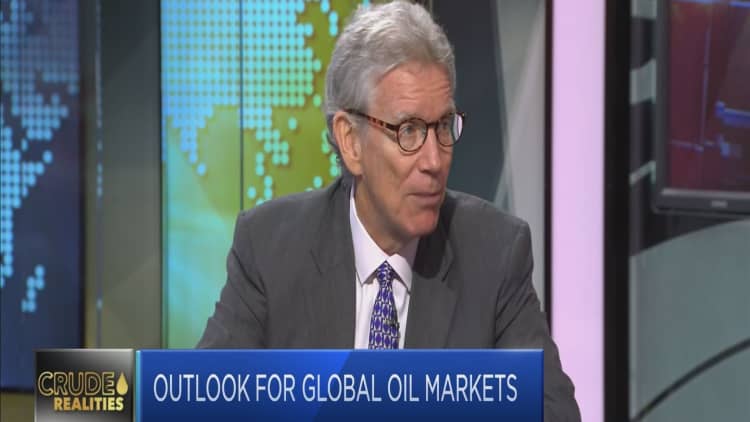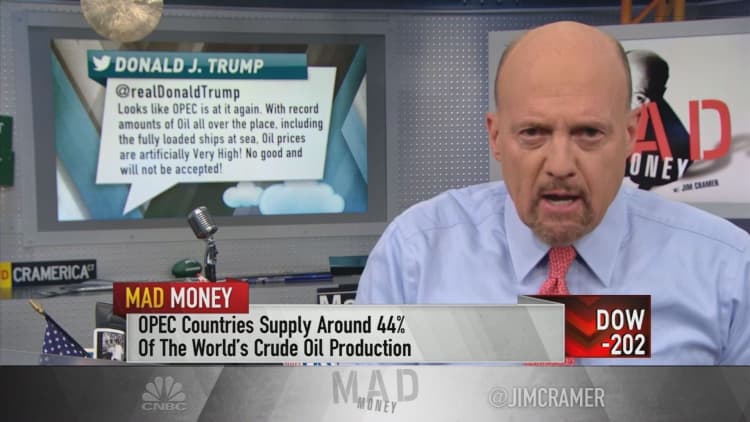Oil prices turned positive in volatile trade on Monday, shaking off early losses to set new highs going back more than three years.
U.S. West Texas Intermediate (WTI) crude futures finished Monday's session up 24 cents at $68.64 a barrel, eking out a new closing high going back to Dec. 1, 2014. Brent crude futures were up 66 cents, or nearly 1 percent, at $74.72 a barrel by 2:29 p.m. ET.
Crude futures jockeyed between downward pressure after Iran dampened hopes that OPEC would extend its production cap pact and support on fears that U.S. sanctions could dampen Iran's output.
Iran's oil minister Bijan Zanganeh said that if crude oil prices continued to rise, there would be no need to extend a pact between the Organization of the Petroleum Exporting Countries and non-OPEC producers aimed at bolstering prices, the ministry's official website SHANA reported.
"It's tweet by tweet," said Phil Flynn, analyst at Price Futures Group, saying the market is swinging in response to posturing from the U.S. and OPEC members.

After reacting in fear, Flynn said the market recovered on conviction that U.S. sanctions could dampen Iran's output, even if the nation produces above its OPEC quota.
The market also found support in U.S. data from energy information provider Genscape, which showed a decline in inventories at the Cushing, Oklahoma storage hub.
Since early 2017, OPEC, Russia and other non-OPEC crude producers have curbed output with the aim of eliminating a global oil glut. The pact runs until the end of 2018.
"We continue to watch whether the fundamental picture continues to tighten," said Gene McGillian, vice president of research at Tradition Energy.
Oil was also pressured early in the session as raw materials sank after the United States gave American customers of Russia's biggest aluminum producer Rusal more time to comply with sanctions, easing fears Washington might target palladium producer Nornickel.
Oil has risen to its highest since late 2014 this month in part too because of nervousness over a decision President Donald Trump must take on whether to restore U.S. economic sanctions on Iran.
"Added price pressure comes from U.S. sanctions against the key oil exporting nations of Venezuela, Russia and Iran," said Kerry Craig, global market strategist at JPMorgan Asset Management.

He was referring to the support to oil prices from U.S. sanctions on Russian companies and individuals, as well as on potential new measures against struggling Venezuela and especially OPEC member Iran.
"Stay long oil," JPMorgan said in a separate note.
The United States has until May 12 to decide whether it will leave a nuclear deal with Iran and impose new sanctions against Tehran, including potentially on its oil exports, which would further tighten global supplies.
"The uncertainty of the administration makes things very difficult," McGillian said, cautioning that sanctions against Iran or Venezuela could also cause market swings.
Oil prices earlier dropped about $1 a barrel as broader financial markets came under pressure from the rise in U.S. government yields towards 3 percent, a level that in the past has triggered aggressive sell-offs in stocks, bonds and commodities.
Oil was also pressured early in the session as raw materials sank after the United States gave American customers of Russia's biggest aluminum producer Rusal more time to comply with sanctions, easing fears Washington might target palladium producer Nornickel.
— CNBC's Tom DiChristopher contributed to this report.

